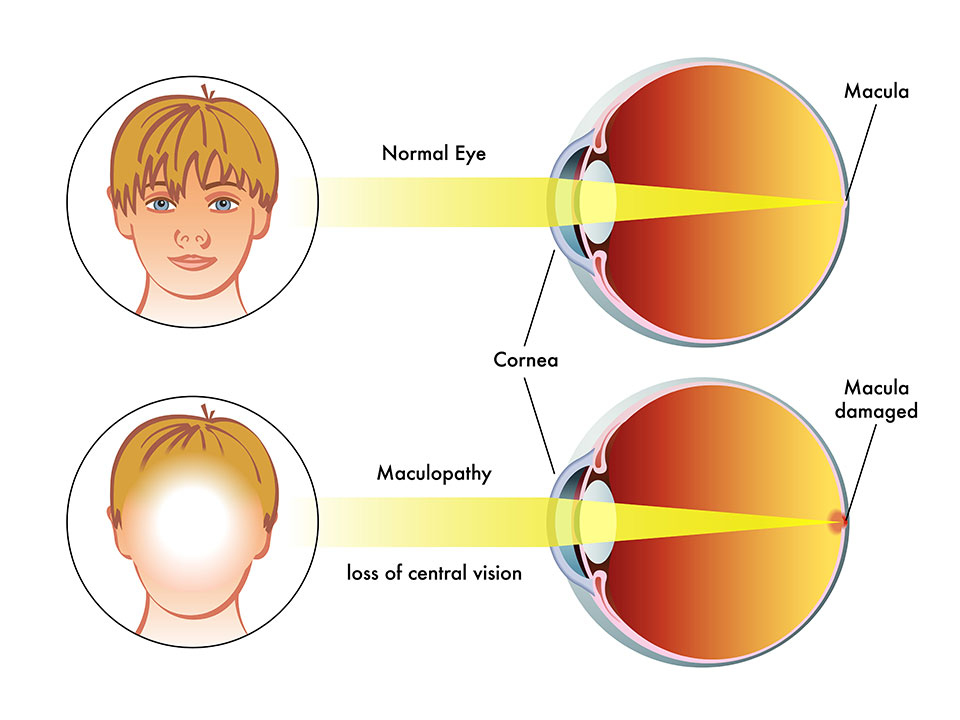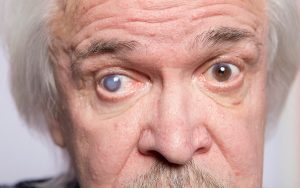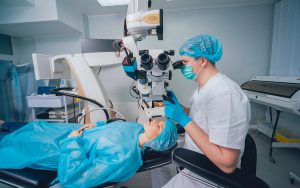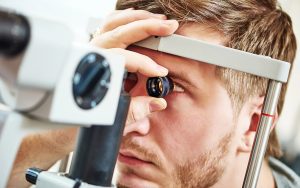Age-Related Macular Degeneration: Facts and Myths

Did you know that more than 20 million people in the United States live with some form of age-related macular degeneration? According to the National Institute of Health, macular degeneration patients will reach 288 million worldwide by 2040. Also known as AMD, age-related macular degeneration is a chronic eye condition that is a leading cause of blindness in people aged 60 and above.
Living with age-related macular degeneration is stressful. But having AMD and being ignorant about it can be more traumatizing.
The Macula
The macula is domiciled in the retina. It’s a small area dense with light-sensitive cells that helps you with a clear vision; when you look straight into something, the object is clear. AMD is an eye disease that interferes with the structure of the macula. Malfunctioning of the macula affects your central vision.
People with age-related macular degeneration have a higher risk of developing irreversible blindness and visual impairment. AMD victims are likely to lose their ability to see straight ahead. However, they can still retain their side vision.
Contrary to popular belief, diagnosing macular degeneration doesn’t necessarily lead to total blindness. As mentioned earlier, one of the best ways of managing AMD is separating myths from facts and working with your doctor to improve your eye health.
Types of Macula Degeneration
Macular degeneration exists in two forms: dry or wet.
Dry AMD is the more common type and is characterized by a slow breakdown of the light-sensitive cells in the macula. Wet AMD is rare but more likely to cause blindness. It’s a more advanced form of macular degeneration.
Interestingly, dry macular degeneration can also advance and cause vision loss without necessarily turning into a wet form of AMD.
When you learn more about your condition, you can also take an active role in your treatment and reduce stress levels. Let’s unpack the misconceptions and amplify the facts about macular degeneration.
Myths:
To separate myths from facts, we’ve sampled a few misleading myths that might inhibit your treatment journey.
Myth#1: There’s No Need for an Eye Exam Unless You Notice Drastic Changes
The truth is that many eye diseases don’t send any early warning signs. Most people only notice a vision change when the damage is already done and the condition is at an advanced stage.
To prevent age-related conditions like AMD from worsening, you need to have regular eye exams. So, always keeping in touch with your ophthalmologist and attending regular eye clinics is the best thing to do.
Early diagnosis will help your doctor monitor your condition, prevent disease progression, and protect your vision.
Myth#2: It’s Normal to Lose Vision as You Age
We can’t deny the fact that old age affects vision. The older you get, the more difficult it gets to see objects closer to you. Yet, severe vision changes represent an abnormality even as you age Acute eye conditions such as age-related macular degeneration indicate an eye disease that may require comprehensive treatment.
Myth#3: You Can Only Get AMD if You Have a Family History of Macular Degeneration
Nothing could be further from the truth. Not all cases of macular degeneration come from people with an AMD family history. Some factors that might increase your chances of getting age-related macular degeneration include smoking, being obese and having fat-rich diets.
Myth#4: You can Self-diagnose Age-related Macular Degeneration
Like most eye diseases, macular degeneration might be very difficult to notice in its earlier stages. So, detecting cases of AMD might be tricky unless you go for a medical examination. Sometimes, you may experience problems with only one eye, but this does not point to a possible case of AMD.
Early symptoms of macular degeneration include:
- Blurred vision
- Difficulty in reading
- Inability to recognize familiar faces
- Straight lines that appear crooked
- Loss of central vision
When you notice the above symptoms, you should visit an ophthalmologist for a quick examination.
Myth#5: Macular Degeneration can’t be Controlled
It’s not true that there aren’t ways to stop macular degeneration from worsening. Preventing AMD might be impossible, but preventing it from worsening is achievable. So, once diagnosed with age-related macular degeneration, you should protect your eyes from ultraviolet light, regulate your blood pressure, and exercise regularly.
More importantly, you need to religiously keep scheduled appointments with your doctor and undertake any recommended treatments.
Facts about AMD
Here are facts every macular degeneration patient should know:
1. It’s Challenging to Notice AMD symptoms in the Early Stages
It might not be possible to notice early changes in your eyes during the initial stages of AMD. You will need a detailed eye exam to prevent macular degeneration from worsening. So, seek the help of an ophthalmologist whenever you have eyesight problems. Don’t wait until age 55.
2. Vision Loss from Macular Degeneration is Irreversible.
Wet AMD is a more severe disease because it causes fluid to leak from blood vessels. Yet, although it might steal your vision, you can still salvage whatever is remaining to help you see through your sunset years.
However, you can control the severity of the disease by getting treatment such as stem cell therapy. While vision loss might be irreversible, sight-saving options are readily available.
3. Smoking Increases the Chances of Getting Age-related Macular Degeneration.
Smoking raises your chances of contracting AMD. It also makes the condition more severe. Quitting smoking is the best initiative you can take to lower the disease risk.
4. Family History is a Major Risk Factor for AMD.
You will likely have macular degeneration if you come from a family with AMD experience. You have a 50 percent risk of macular degeneration if you have a parent or sibling with a history of AMD.
Takeaway
The best way to keep your eyes healthy is to see your doctor for regular eye exams. When you visit your doctor, you can also ask questions and get all the correct information about age-related macular degeneration and other eye conditions. You can use vision rehabilitation services and devices to help you with your remaining vision.




